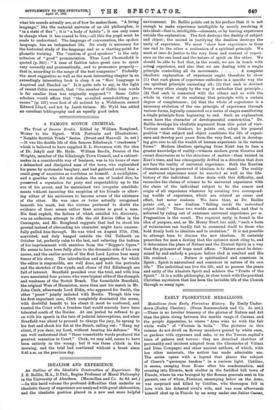A FAMOUS SCOTCH CRIMINAL.
The Trial of Deacon Brodie. Edited by William Roughead, Writer to the Signet. With Portraits and Illustrations. "Notable Scottish Trials" Series. (Sweet and Maxwell. Is. net ) —It was the double life of this famous Edinburgh " cracksman" which is believed to have supplied R. L. Stevenson with the idea of Dr. Jekyll and Mr. Hyde. William Brodie, Deacon of the Wrights, member of the Edinburgh Town Council, and a cabinet- maker in a considerable way of business, was in his hours of ease a debauched and dissipated man of the town, who replenished his purse by systematic burglary, and had gathered round him a small gang of associates as worthless as himself. A cockfighter, and a gambler who did not disdain the use of loaded dice, he preserved a reputation for piety and respectability up to the eve of his arrest, and he maintained two irregular establish- ments without incurring the suspicion of his friends or allow- ing either of his mistresses to become aware of the existence of the other. He was once or twice actually recognised beneath his mask, but the victims preferred to doubt the evidence of their senses rather than accuse so good a man. His final exploit, the failure of which entailed his discovery, was an audacious attempt to rifle the old Excise Office in the Canongate, and Mr. Roughead suggests that bad he stood his ground instead of absconding his character might have success- fully pulled him through. lie was tried on August 27th, 1788, convicted, and duly hanged outside the Old Tolbooth on October 1st, perfectly calm to the last, and relieving the tedium of his imprisonment with snatches from the "Beggar's Opera." He seems to have been fully alive to the dramatic side of his own career, and the earlier novels of the first Lord Lytton bear many traces of his story. The introduction and appendices, for which the editor is responsible, are well done, and both the portraits and the sketches of the wynds and closes of Old Edinburgh are full of interest. Brasfield presided over the trial, and with him were associated four puienes who were typical alike of the strength and weakness of the Scotch Bench. The formidable Brasfield, the original Weir of Hermiston, more than met his match in Mr. John Clerk, afterwards Lord Eldin, who appeared for Smith, the other "panel". jointly indicted with Brodie. Though this was his first important case, Clerk completely dominated the arena, with doubtful benefit to his client it must be confessed, and treated the Court with a freedom that would scarcely have been tolerated south of the Border. At one period he refused to go on with his speech in the face of judicial interruptions, and when Brasfield was about to proceed to charge the jury, he sprang to his feet and shook his fist at the Bench, calling out: "Hang my client, if you dour, my Lord, without hearing his defence." We can well understand that "these remarkable words produced the greatest sensation in Court." Clerk, we may add, seems to have been entirely in the wrong; but it was three o'clock in the morning, and the trial had continued without a break since 8.45 a.m. on the previous day.


























































 Previous page
Previous page